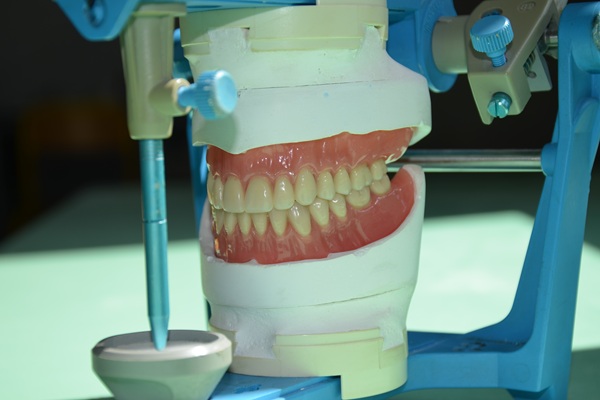Partial Dentures: A Functional and Aesthetic Solution for Missing Teeth

Those missing one or more teeth with healthy natural teeth can benefit from partial dentures. Not only do partial dentures help people chew food correctly, but they also restore the appearance of a smile. Choosing partial dentures allows a patient to regain comfort and confidence without complicated procedures.
What are partial dentures?
Partial dentures are removable oral appliances that fill in spaces left by missing teeth, helping restore the mouth's function and appearance. They consist of replacement teeth attached to a gum-colored plastic base. Sometimes, the base connects to a metal framework to hold the denture in place in the mouth. Dentists recommend partial dentures for patients who still have healthy natural teeth.
Types of partial dentures
Partial dentures come in a few different varieties to address the needs and preferences of different patients. A dentist will help determine the most suitable option.
Traditional partial dentures
Traditional partial dentures use a metal framework with plastic teeth and gums attached. These traditional partial rely on metal clasps that grip natural teeth to hold them in place. Traditional partial dentures are effective for long-term use thanks to their durability, strength, and stability.
Flexible partial dentures
Denture wearers like flexible partial dentures because they do not have metal parts. They consist of thin, lightweight materials that allow them to bend and adapt comfortably to the mouth. This gives them a more natural look. Their comfort and natural appearance make them a popular choice.
Acrylic partial dentures
Acrylic partials are another common option. They are made completely of acrylic resin, making them less expensive than traditional metal-based dentures. Acrylic partials work best for short-term solutions or temporary use while a patient waits for a permanent denture or other dental work.
Benefits of choosing partial dentures
Partial dentures offer numerous benefits to patients with missing teeth. One significant advantage is improving chewing and speaking abilities. When teeth are missing, it can be hard to chew food properly or speak clearly. A partial denture helps restore normal function, making it easier to eat and talk.
Another advantage is preventing teeth from shifting. When gaps from missing teeth are left untreated, the remaining teeth often shift position to fill the space. This shifting can lead to further dental problems and affect a person's bite. A partial denture fills the gap and helps maintain the alignment of the remaining teeth.
Partial dentures also help maintain the structure and shape of the face. Teeth provide essential support to the facial muscles. When teeth are lost, the face can sag or appear older. Partial dentures offer support, keeping the facial muscles firm and maintaining a youthful appearance.
Finally, partial dentures can enhance a person's self-confidence. A complete and natural-looking smile helps individuals feel good about their appearance. When patients no longer worry about missing teeth, they often feel more confident in social situations.
Caring for partial dentures
Proper care of partial dentures is essential to maintaining oral health and prolonging the life of the denture. Daily denture cleaning removes food particles and helps prevent staining. Dentists recommend using a denture-specific cleaner or gentle soap, along with a soft-bristled toothbrush, to clean dentures thoroughly.
When not worn, dentures should be soaked in water or a denture-cleaning solution to keep them moist. Allowing dentures to dry out can cause them to lose shape and become uncomfortable.
Even for denture wearers, regular dental appointments continue to be important. Dentists can adjust dentures as needed, ensuring they continue fitting comfortably. These regular checkups also give the dentist a chance to catch any oral health issues early.
Common concerns with partial dentures
While partial dentures offer many benefits, patients might face some challenges initially. Adjusting to dentures can take time, with some patients experiencing mild discomfort or difficulty speaking. Practicing speaking and chewing can help patients adapt quickly. Most people adjust fully within a few weeks.
If a partial denture feels uncomfortable or loose, patients should contact their dentist promptly. Adjustments or minor repairs can often solve the problem quickly, restoring comfort and function.
Regain your smile and confidence
Partial dentures provide both a functional and aesthetic missing teeth solution, helping patients regain the ability to chew, speak, and smile with confidence. With proper care and regular dental visits, these dentures offer a reliable, comfortable, and affordable way to restore dental health. Anyone considering partial dentures should consult a dentist to discuss how this effective dental treatment can enhance their quality of life.
Request an appointment here: https://princewilliamdental.com or call Prince William Dental at (703) 662-8287 for an appointment in our Gainesville office.
Check out what others are saying about our dental services on Yelp: Dentures and Partial Dentures in Gainesville, VA.
Recent Posts
Dentures can be the perfect solution for missing one or multiple teeth. After all, your smile says a lot about you. The first thing a new acquaintance may notice about you is your teeth, and you want that first impression to be a pleasant one. Dentures can help restore your smile, but it's important that…
Partial dentures are one of the most cost-friendly and effective options for replacing missing teeth. They can either be removable or fixed dentures. This is a guide on what partial dentures are, their benefits, and how to care for them.Partial dentures, commonly known as partials, are artificial replacement teeth that replace a patient's missing teeth. Partial…
There are multiple denture options if you are looking to replace missing teeth. These solutions can help prevent many unwanted side effects of tooth loss, leading to better oral and overall health.The loss of permanent teeth can happen for various reasons, from severe tooth decay and gum disease to traumatic injuries or underlying health conditions.…
There are many treatments available to restore missing teeth, but dentures are among the most common. They consist of appliances that are usually removable and consist of a base of hard acrylic or metal that supports artificial teeth. Their purpose is to restore oral function so that you can talk and eat more or less…


